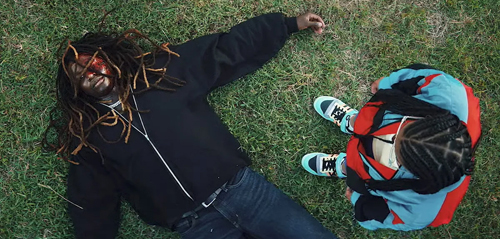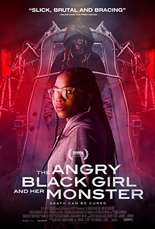
Mary Shelley’s foundational science-fiction/horror novel Frankenstein inspired this tale of systemic violence and grief gone mad. First-time filmmaker Bomani J. Story crafts a solid narrative of a young woman obsessed with bringing her slain brother back from the dead.
Brilliant Vicaria (Laya DeLeon Hayes) believes death is nothing more than a disease that can be cured, a theory that seeded in her mind following the accidental shooting death of her mother and the intentional murder of her brother Chris (Edem Atsu-Swanzy) by rival gang members. She snatches Chris’ body just after he was fatally gunned down, stowing the corpse in an abandoned utility room on her projects’ grounds.
Vicaria builds a machine that can harness the electricity from a nearby power station, and much like other Frankenstein adaptations before it, the ins and outs of this machine aren’t explained in full, letting the viewer suspend disbelief without a lot of cockamamie, pseudo-scientific jargon weighing the proceedings down. And much like in Frankenstein, Vicaria is successful in bringing Chris back, though of course he comes back all wrong. The gentle giant is now a bloodthirsty fiend whose motivations for killing are just as fuzzy as the methods that reanimated him. This is less Mary Shelley, more Hammer; the creature here isn’t a ponderous malcontent out for revenge, but a brute who can’t help but harm others indiscriminately — or at least, whenever he feels threatened.

Can Vicaria keep him a secret without losing her own life? This basic task is made all the more difficult by Kango (Denzel Whitaker), a local drug dealer who forces Vicaria to help him with his business after she steals some of his heroin to keep it off the streets and out of the hands of her father (Chad L. Coleman). Also complicating matters is Jada (Amani Summer), Vicaria’s little cousin, who seems to befriend Chris. To say that things eventually go sideways is an understatement.
There is much to love about The Angry Black Girl and Her Monster, but particular praise must be given to Hayes’ performance as Vicaria. She plays the role with subtlety and a plethora of emotions overlapping and interweaving with one another — from the titular anger to fear to joy and beyond. We understand the character as brilliant for her age, but we also see shades of her youth and at times naivety bleed through the brilliance, making the film overall as much a coming-of-age narrative as it is a horror film about life and death.
The look of the creature is especially impressive as well, as is the machinery that brings him back to life. Both harken directly back to James Whale’s iconic 1931 Frankenstein, with the creature’s hulking frame and sutured visage, and the elaborate electrical mechanics of Vicaria’s invention. These fantastical elements contrast nicely with the lived-in feel of the projects setting, a backdrop that allows the filmmaker to explore reality-based horrors like gang violence, poverty and drug addiction. It makes Vicaria’s quest all the more believable — who wouldn’t want to eradicate death in an environment like this?
The Angry Black Girl and Her Monster is overall an engaging and nightmarish update on a literary classic, one squarely positioned in modern day concerns yet also painted in broader, more universal themes, giving it a feeling of timelessness, much like Shelley’s novel. Story shows tremendous talent, and one cannot wait to see what he does next. —Christopher Shultz

